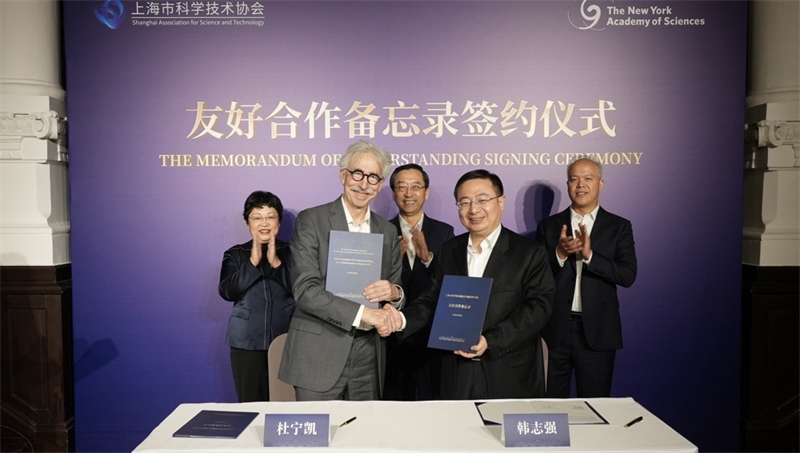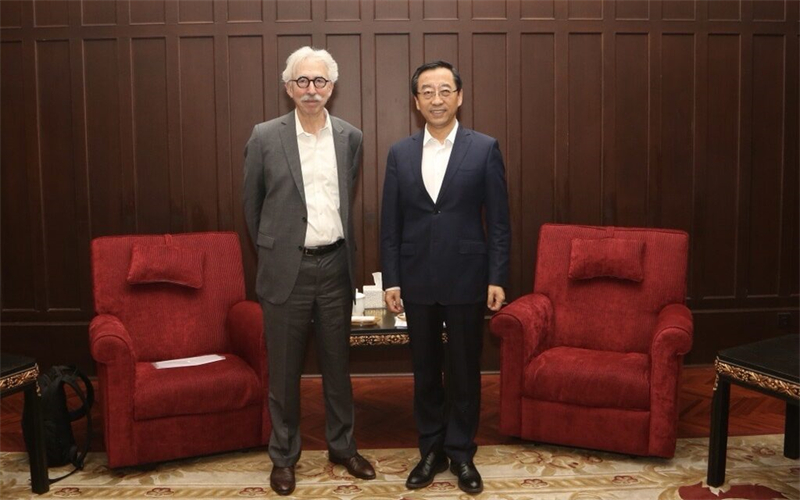By NICK FETTY
The New York Academy of Sciences and the Shanghai Association for Science and Technology are teaming up to advance science and innovation on a global scale.

Nicholas B. Dirks, President and CEO of The New York Academy of Sciences, shakes hands with Zhiqiang Han, Executive Vice President of the Shanghai Association for Science and Technology, after signing a memorandum of understanding for a new collaboration between the two institutions.
Photo credit: Official website of The New York Academy of Sciences
Science diplomacy took a significant step forward recently, when Nicholas B. Dirks, President and CEO, The New York Academy of Sciences met with representatives from the Shanghai Association for Science and Technology (SAST) in Shanghai, to discuss hosting international science and technology forums. The resulting agreement codified a partnership dedicated to advancing long-term collaborations between the two institutions, as well as collaboration on youth scientific and technological education and innovations.
"Global issues require global solutions," said Dirks. "This new partnership will be an excellent way for us to strengthen the relationship with our partners in Shanghai and other parts of China where promising STEM education, research and innovation are taking place. Given the current geopolitical climate, it is critical for us to develop these kinds of international collaborations to advance solutions for the public good globally."
This sentiment was echoed by Professor Zhang Jie, President of the SAST. "A small step today is a giant leap for the future to promote scientific and technological cooperation between China and the United States, and even globally," said Zhang. "Through the collaboration, we hope that more American scientists and even global scientists will understand Shanghai and China better, come to Shanghai and China, and carry out borderless scientific and technological cooperation."
Enhancing the Junior Academy
A follow-up visit by Meghan Groome, PhD, Senior Vice President of Education at the Academy, advanced the conversation on potential in-person and virtual collaborations for students studying STEM (science, technology, engineering and mathematics). The Academy's award-winning Junior Academy provides a scalable and impactful way for students to participate in virtual exchange programs. The Academy plans to expand its partnership with students of Shanghai through increased outreach to schools in the region.

Nicholas B. Dirks, President and CEO of The New York Academy of Sciences, and Jie Zhang, President of the Shanghai Association for Science and Technology.
Photo credit: Official website of The New York Academy of Sciences
While in Shanghai, Dr. Groome also addressed the Deeper Learning China conference, an event dedicated to building a community of educators in China focused on Project Based Learning. in collaboration with Deeper Learning Global. Dr. Groome encouraged educators to take a light-hearted approach to implementing AI in the classroom, while building their knowledge base about the strengths and weaknesses of different AI products. She also discussed future plans with the Deeper Learning China leadership, to explore ways to expand The Junior Academy, a “game changing” student collaboration and research network, to more schools in China.
The Role of Artificial Intelligence
Groome also participated in the first "China-United States Seminar focused on the Vision and Future Feasibility of Artificial Intelligence in Arts Education". At the Nine Trees Performing Arts Complex in Shanghai, she spoke about the importance of understanding the impact AI will have on our societies as a whole, including the arts.
"Although my focus is STEM, I'm increasingly relying on my background in the arts to help explore and explain these large, technological shifts in our lives. We can no longer teach in siloes but must expand how the integration, or convergence of subjects can lead to a better understanding of our changing world," she told the audience. "I believe that AI can expand access to the highest quality arts (and STEM) education through AI-driven software and instruments. Like with sports, AI can enhance our practice time, providing us with expert feedback anytime, anywhere. Finally, it can dramatically enhance our creativity and allow us to collaborate like never before."
Source: Official website of The New York Academy of Sciences